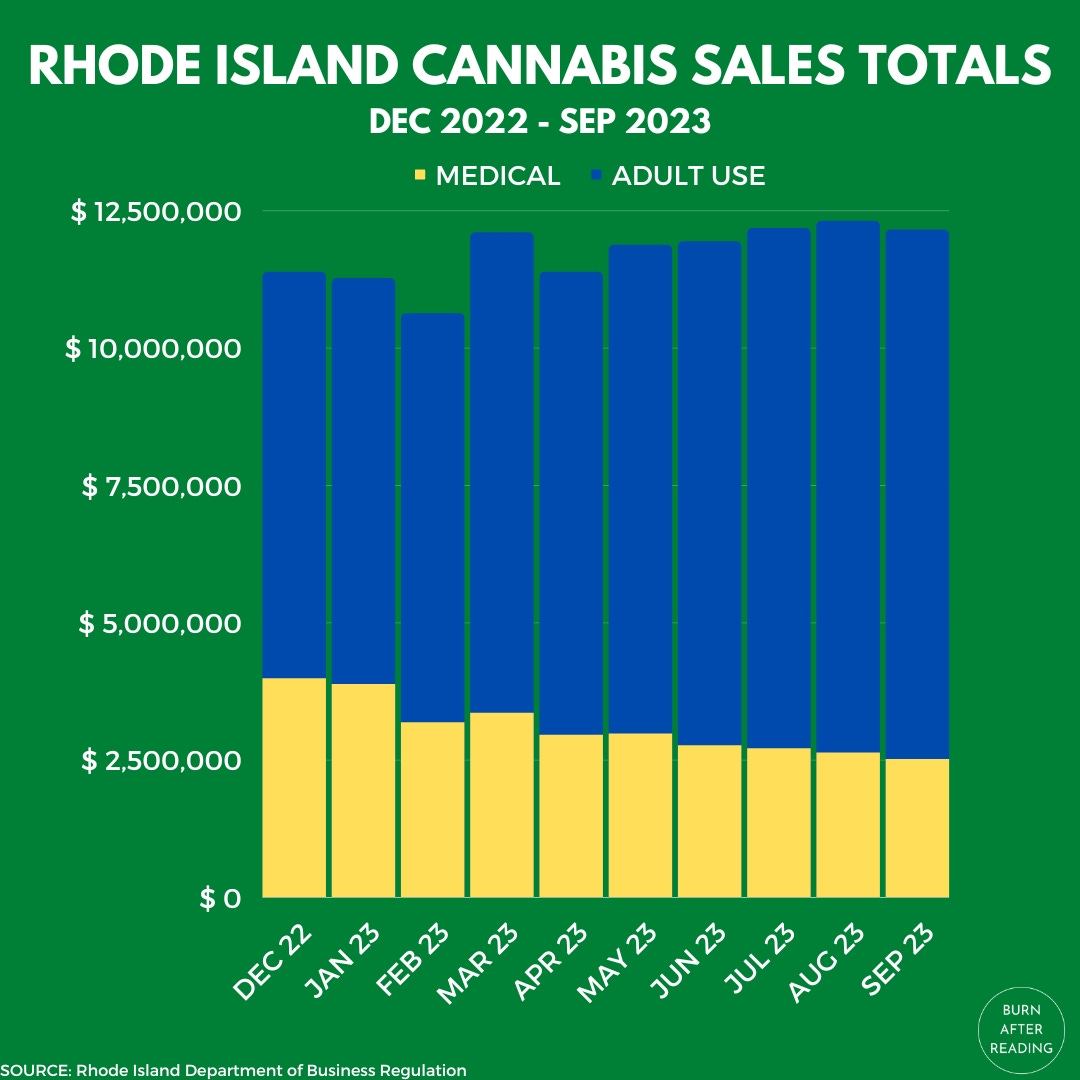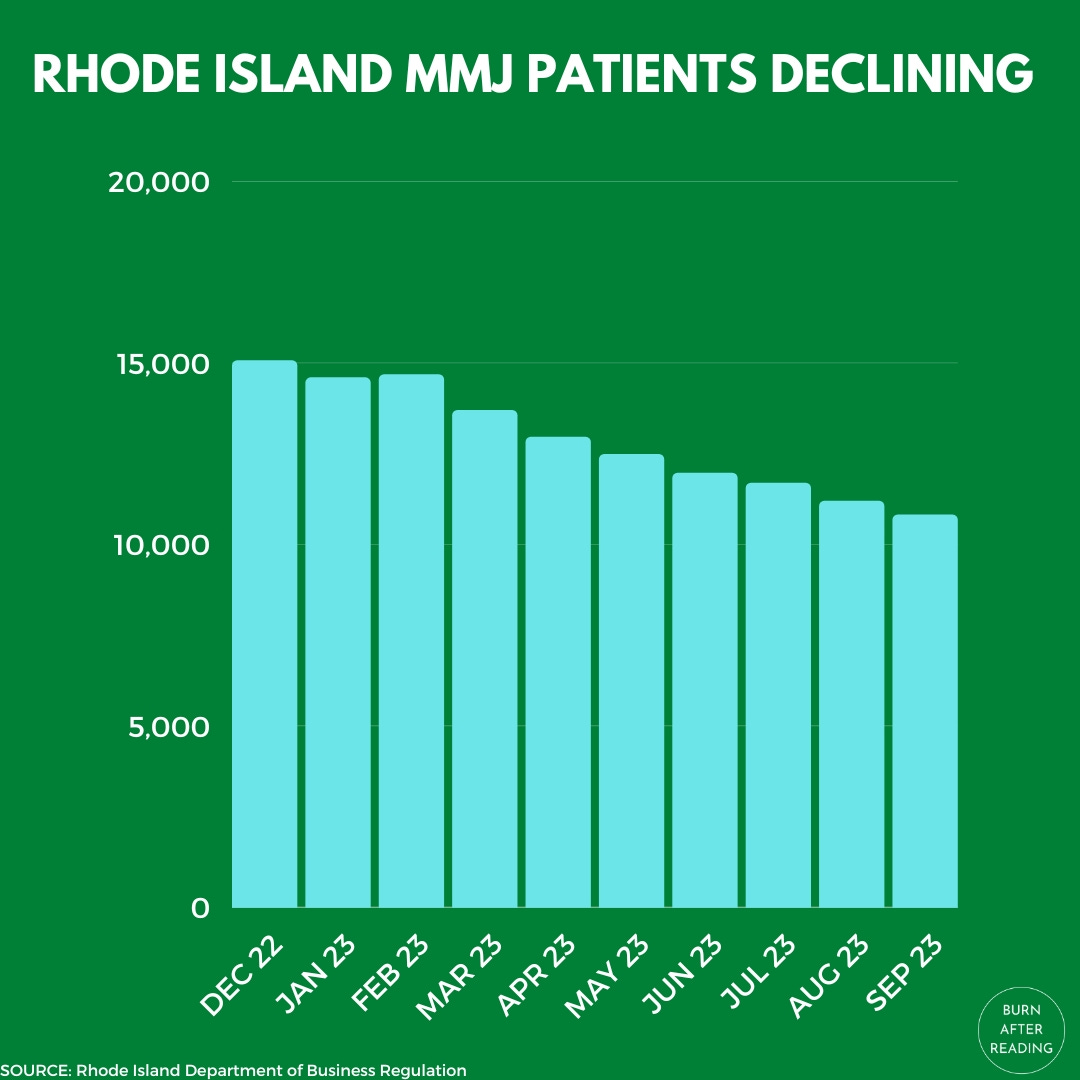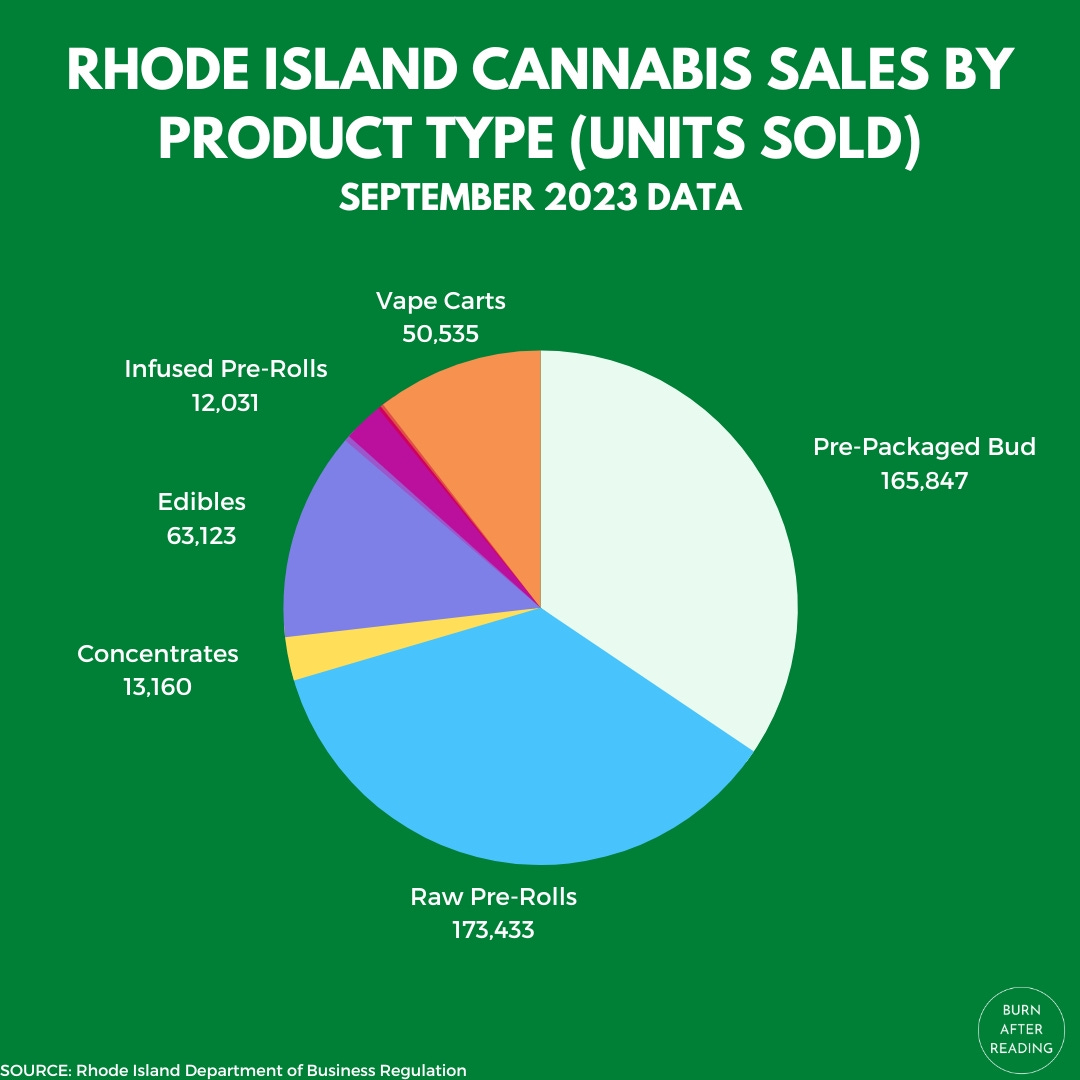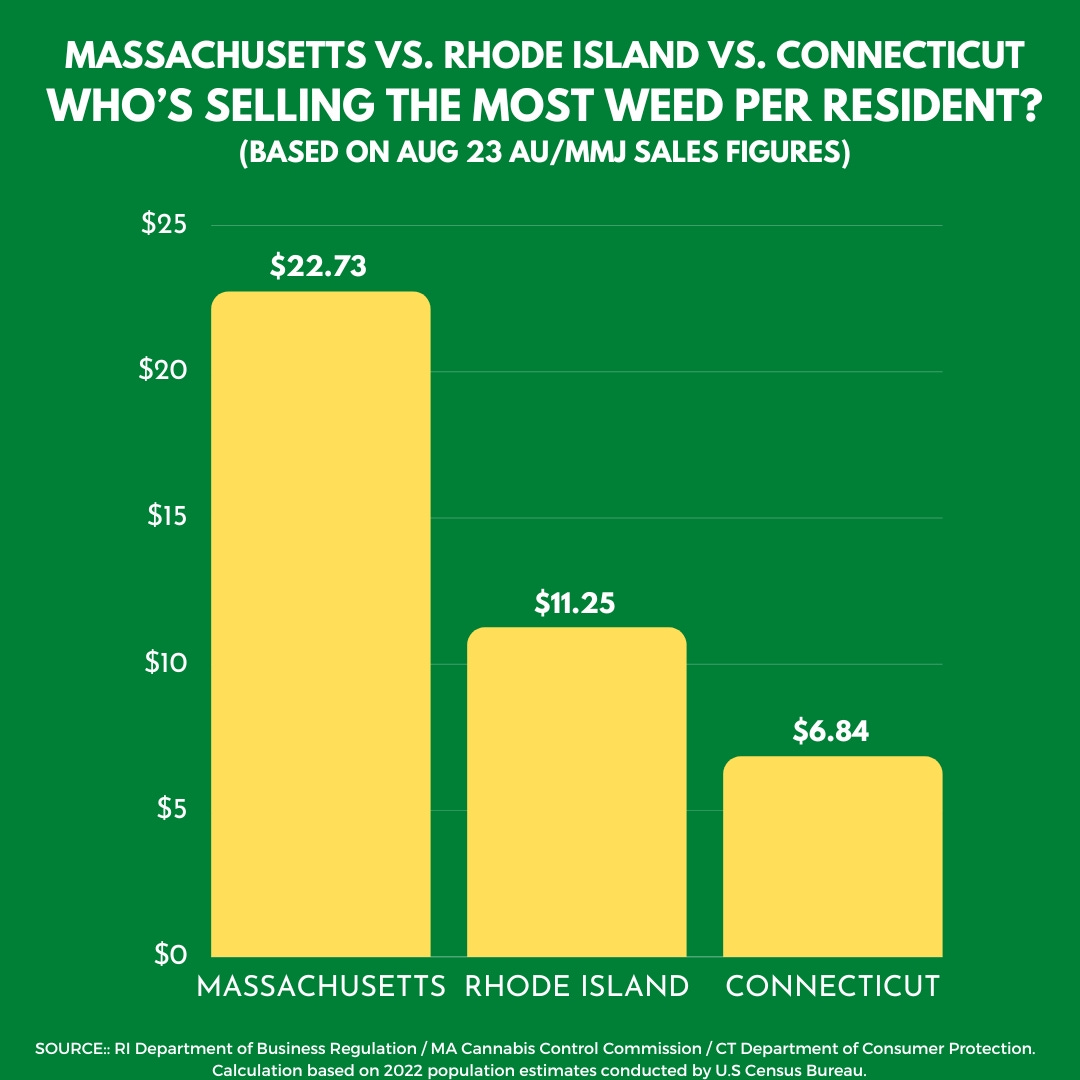Issue 66: Rhode Island Cannabis Numbers
After 10 Months of Legal Sales, Rhode Island's Market Is Taking Shape
This week, I turn my attention back to Rhode Island to see how things are progressing with the state’s cannabis market.
Also: be sure to check out the piece I wrote earlier in the week detailing OSHA’s investigation into Trulieve’s former facility in Holyoke, Mass.
Rhode Island Cannabis: By The Numbers
Examining How The Things In the Ocean State Are Shaping Up After 10+ Months Of Legal Cannabis Sales
As we get closer to the one year anniversary of the first legal recreational cannabis sale in Rhode Island, let’s take a closer look at how the state's market is evolving.
Total Sales See Slight Decline In September
While many states have seen uninterrupted growth following the launch of recreational sales, Rhode Island’s market already appears to be bumping into its ceiling; sales declined about $40,000 between August and September.
The state’s average sales receipt has also dropped from $32.19 in December 2022 to $26.11 in September 2023. While it would be easy to blame this drop on the fact that prices in the state appear to be declining, many product categories saw fewer units sold in September than they did in August.
The opening of more dispensaries might help boost these numbers, but it appears the state is still over a year away from making that happening.
Number of Medical Patients Dropping Rapidly
The number of medical marijuana patients in Rhode Island has declined about 28% since the adult use program launched in December 2022.
The most likely cause of this rapid drop is the fact that medical marijuana patients in Rhode Island don’t receive the same amount of tax benefits as patients in some other states. While Massachusetts patients are able to make purchases without paying any tax, Rhode Island patients still have to pay the state’s 7% sales tax.
Patients do avoid paying the extra 10% tax that adult use customers pay, but it seems that the savings aren’t worth navigating the bureaucracy of obtaining a recommendation and card.
Flower Products Still Dominate The Market
Cannabis flower and pre-rolls are still the most popular methods of consumption in most markets, and Rhode Island is no different. These two product types make up a combined 70.6% of the market.
Sales of infused non-edibles (1,644), tinctures (965) and topicals (934) are too small to be visible on the graph.
Massachusetts Still King of The Southern New England Cannabis Scene
Considering the fact that Massachusetts has a larger population than Rhode Island and Connecticut combined, it probably shouldn’t be a surprise if the Bay State always sells more weed than its southerly neighbors. But even when we attempt to adjust for population, MA is still selling way more weed per resident than RI or CT.
There are some caveats to this comparison: Population numbers don’t represent the total potential market for legal cannabis sales, as they don’t account for college students, tourists, and other out-of-state visitors. Product prices also vary between states.
ICYMI: OSHA Documents Reveal Realities of Trulieve's “Special Industrial Air Filtration System” In Holyoke Facility
Earlier in the week, I published the first part of a two part series looking at OSHA’s investigation into Trulieve. Part one examined the details surrounding Lorna McMurrey’s death and the air quality tests conducted by OSHA.
Keep an eye out for part two in the next week or two.
A Message From Our Friends At Trella:
Committed caregiver or farmer? Part of the "overgrow and share" movement? 🌿 Dive into Trella's Grow More With Less Program. Boost yields with our plant-training system. Sliding scale available, but first: apply! Elevate your grow and community impact! Apply Now!
New England
Massachusetts Cannabis Company Suing Over Host Community Agreement Fees (TG Branfalt | Ganjapreneur)
A Pittsfield, Massachusetts cannabis company is suing the city over its Community Impact Fees, alleging officials have not identified any “impacts” the company has had on the community, JD Supra reports. Under the state’s legalization law, the Community Impact Fees imposed on cannabis businesses must be “reasonably related” to the costs incurred by a municipality as a result of cannabis business operations and municipalities must furnish annually documentary proof of such costs to operators.
ANALYSIS: As the article points out, this isn’t the first time Pittsfield has been sued for allegedly violating rules around community impact fees. With more and more attention being paid to this issue, it seems like the days of municipalities using these fees as a blank check are coming to an end.
FEDERAL HEMP REGULATIONS TRIP UP VERMONT GROWERS (Rachel Hellman | Seven Days)
No one interviewed by Seven Days, including an attorney who specializes in CBD and hemp compliance, had previously heard of a situation similar to Bellavance's. At least two of the 33 Vermont hemp growers registered with the USDA are also licensed by the state to cultivate weed. Neither returned requests for comment. A USDA spokesperson did not respond to repeated requests for comment, even after agreeing to answer written questions.
Vermont regulators, too, were stumped by Bellavance's situation and are seeking clarity as they grapple with a largely unregulated hemp market and unpredictable federal oversight.
"It's not even just confusion amongst the hemp farmers," said James Pepper, chair of Vermont's Cannabis Control Board, which regulates the state marijuana market. "I think there's confusion at the USDA about if this is possible or not."
ANALYSIS: Confusion like this is always bound to occur when it’s left up to individual employees at federal agencies to attempt to figure out the increasingly murky situation surrounding the legality of cannabis in this country.
Rest of U.S / National
MARIJUANA COMPANIES AND INVESTORS MAKE GRAB FOR ARIZONA’S SOCIAL EQUITY LICENSES AHEAD OF RETAIL LAUNCH DEADLINE (Natasha Yee | Arizona Center for Investigative Reporting)
One social equity license holder signed an operating agreement that would put his business up to $3 million in debt before it opened. Another believed she entered into a contract with a dispensary owner, only to find herself partnered with a stranger.
A pair of friends disagreed about whether to sell their license, prompting another big dispensary to get involved. When one woman refused to sign an operating agreement with the investor who backed her application, he later obtained the license through arbitration.
The shifts in ownership offer the most recent glimpse into how powerful entities dominated Arizona’s social equity program in a way that some argue was by design, ultimately enriching those who helped craft the voter-approved initiative. Even as court records reveal facets of each case, sealed settlements largely shield voters from knowing who ultimately benefits from a program they approved.
ANALYSIS: It’s hard to argue that Arizona’s program is creating generational wealth for those who have been impacted by the War on Drugs. Some would argue that the program was set up for this type of stuff to happen.
CALIFORNIA GOVERNOR REJECTS MARIJUANA MARKETING CURBS, CONSUMPTION CAFES (Chris Casacchia | MJBizDaily)
California’s latest legislative session is shaping up as a mixed bag for the state’s marijuana industry.
Cannabis businesses scored a key victory after Gov. Gavin Newsom over the weekend spiked a bill that would have imposed new marketing and packaging restrictions on marijuana products.
But the governor also nixed an industry-backed measure that would have permitted marijuana cafes, dealing a major setback to retailers and consumption-lounge operators.
ANALYSIS: This move to veto the packaging bill shows that at least some politicians feel there’s a middle ground between Canada’s incredibly sterile packaging and some of the absurd packaging we see with illicit products.
At the same time, it seems like Newsom’s veto of the social consumption bill doesn’t really acknowledge the fact that plenty of people are already illegally consuming cannabis in public areas across California.
TRULIEVE ADDS $500K TO FLORIDA RECREATIONAL MARIJUANA INITIATIVE (CBS News Miami)
The medical cannabis company Trulieve has added $500,000 to a ballot initiative aimed at legalizing the recreational use of marijuana, bringing its total contributions to $39.55 million, according to a newly filed finance report.
Trulieve has contributed all but $124.58 of the money raised by the political committee Smart & Safe Florida, which is leading the initiative. The committee had spent $39.545 million as of Sept. 30, the report posted on the state Division of Elections website showed.
ANALYSIS: What’s another $500K to a company worth about a billion dollars? Trulieve continues to bet on the idea that Florida voters will support their legalization proposal, but when consider the fact that a) a constitutional amendment needs 60% approval to pass in Florida and b) over 800,000 residents already have access to cannabis via the state’s medical program, I remain skeptical that they’ll have the votes next November.
BANKRUPTCY COURT REFUSES TO DISMISS MARIJUANA INDUSTRY DEBTOR CHAPTER 11 CASE (Schuyler G. Carroll, Bethany D. Simmons and Noah Weingarten | Reuters)
The Hacienda court's refusal to dismiss a bankruptcy case, where a debtor is found to have likely engaged in ongoing violations of federal law post-petition, represents a departure from the outcome other bankruptcy courts have reached. While the U.S. Trustee may decide to appeal the denial of its motions to dismiss, and could prevail on appeal, the decisions in Hacienda may pave a way for certain debtors that operate in the marijuana industry to utilize bankruptcy as a viable option going forward. Of course, it is important to recognize that the Debtor was not operating a marijuana business and was using the bankruptcy court to liquidate its assets and there may have been a different result if the debtor were operating a marijuana business.
ANALYSIS: Bankruptcy court is just one of many things that I’m not an expert in, but this ruling seems to have some implications for cannabis businesses.
International
🇨🇦 CANADIAN REPORT DETAILS TROUBLES PLAGUING NATION’S CANNABIS INDUSTRY ( Matt Lamers | MJBizDaily)
A preliminary report by a government-appointed panel of experts analyzing Canada’s adult-use legalization law paints a bleak picture of the nation’s 5.6 billion Canadian dollar ($4 billion-plus) cannabis industry, documenting significant bankruptcies, major racial disparities, piles of unpaid business taxes and a host of other issues.
The 113-page document – issued five years after the landmark 2018 Cannabis Act – is part of a “what we heard” report that summarizes the five-member panel’s meetings with hundreds of stakeholders, executives and health experts.
ANALYSIS: I haven’t had time to examine the full report, but I don’t think these concerns can be discussed by the cannabis industry by simply saying “but what about alcohol?”
There’s a lot going on in the world right now, but my ego hasn’t inflated to the point where I think readers would be interested in my thoughts on what’s happening in the Middle East. So instead, here’s a nice distraction from all of that: the 2023 winners of the Wildlife Photographer of the Year Awards.
I imagine the guy who hiked to the top of a desert mountain to capture two ibexes fighting might be upset that he lost to a picture of a horseshoe crab, but that’s life for you.
This week’s cat is Tomy, who’s available for adoption at Bay Path Humane.
Special Bulletins
The CCC scheduled another meeting on Monday to further discuss potential changes to rules governing delivery licenses. I’ll be back early next week with a summary of both meeting for premium subscribers.











